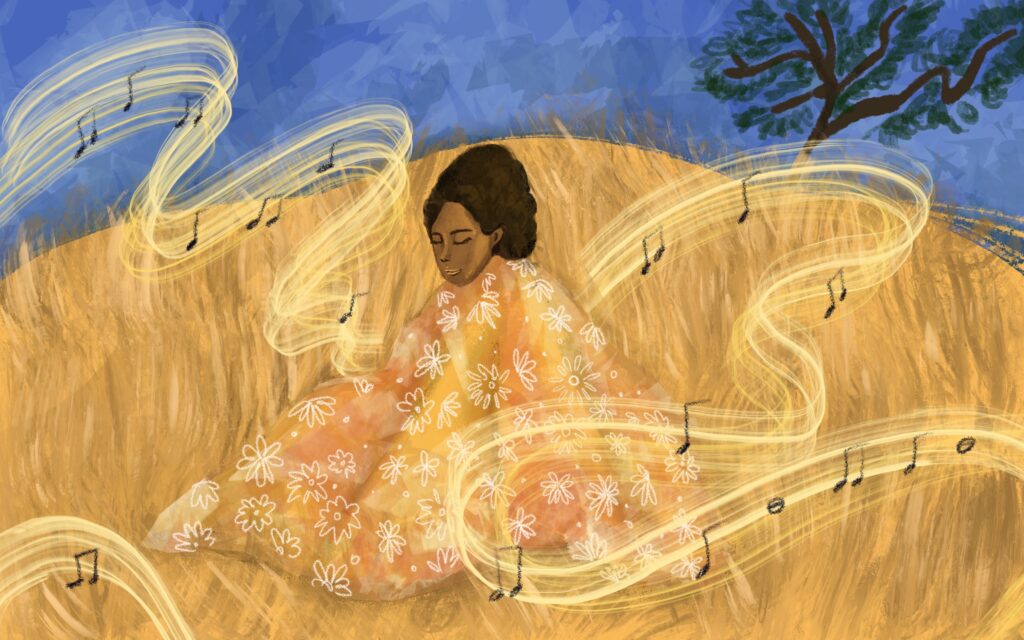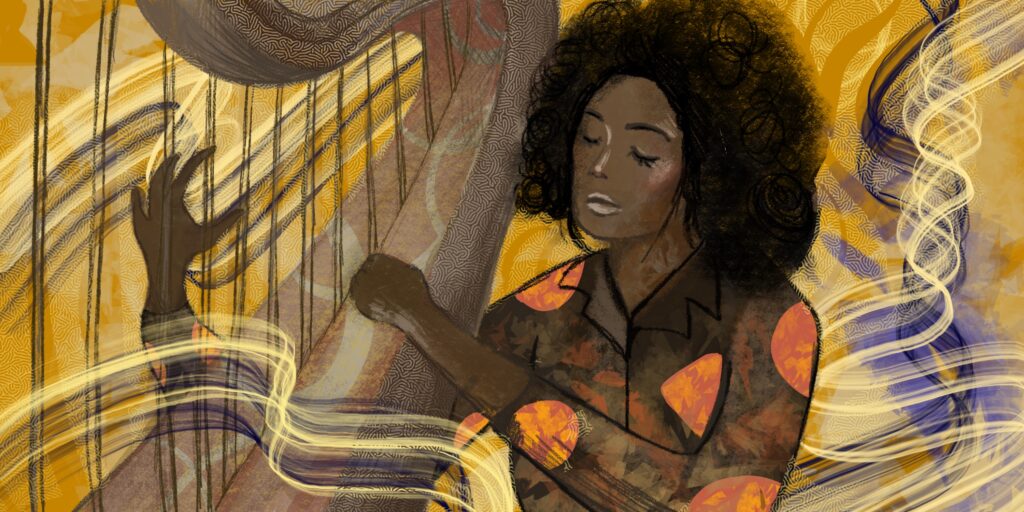Alice Coltrane has been lionized for her light and her loving devotion to God and the spirits since her first collaborations (on albums with Terry Gibbs and her husband, John Coltrane), and her earliest band-leader albums on “Impulse!” such as 1971’s “Journey in Satchidananda” and “Universal Consciousness.” With her newest work, however, the posthumously released “The Carnegie Hall Concert,” the full flower of who and how Alice Coltrane opened up and spread her divine brand of free, prayerful jazz presents itself at its most epic in celebration of her own compositions and that of her husband. Additionally, this same “Carnegie Hall Concert” from 1971 further connects her with her husband’s legend, while proving – once and for all – that her vision was as bold and unique as it was holy and haunting.
When 20th-century jazz titan John Coltrane penned his liner notes to 1965’s “Meditations,” and stated, “I believe in all religions,” the saxophonist and composer had, indeed, been through so many different spiritual practices by that point. Born a Christian, with grandparents steeped in the Methodist Episcopal Zion Church, Coltrane worked his way through Islam before finding the light in God and the spiritual awakening that comes with Indian religious philosophies. Though the saxophonist began opening himself more readily to Heaven’s higher powers toward the end of the 1950s – a religious awakening that aided him in finding his way out of his decade-long heroin addiction – Coltrane credited his newly-shared belief systems on his second wife, pianist and harp player Alice McLeod.
Alice Coltrane, as she came to be known, held her own brand of light and set an agenda, personal and musical, for her own search for truth – one that not only inspired her husband to create richly-reaching works such as “A Love Supreme,” “Ascension” and “Om.” The Coltranes became a towering team devoted to the Bhagavad Gita and Zen Buddhism, and readings of the Bible, the Kabbalah, the Qur’an, the Tibetan Book of the Dead, Aristotle and Plato, and, most deeply, Paramahansa Yogananda’s Autobiography of a Yogi.

When her husband left this earth in 1967, Alice Coltrane’s life and work became one long, continuous, spiritual journey in order to commune with God: travels that brought her deeper into Hinduism and sannyasa where she became the Transcendental Lord’s Highest Song of Bliss, with roads leading her to become a guru of the Shanti Anantam Ashram and create complex and original melodies based on the traditions of world and gospel music. If her husband and his acolytes practiced free jazz, Alice Coltrane’s music was freer and flew farther in its ultimate influence of 21st-century jazz expressionists, saxophonist Lakecia Benjamin and pianist Georgia Anne Muldrow, both of whom have dedicated works to Coltrane. Modern electronic musician and Brainfeeder label owner Steve “Flying Lotus” Ellison is Alice Coltrane’s grandnephew, and created new music based on samples of her harp (her “Blue Nile” composition) for his own new song, “Drips//Auntie’s Harp.” Instrumental death metal ensemble Sunn O))) pay their respects to harpist and Hindu hero Coltrane, namechecking her on their song, “Alice,” as does songwriter Laura Viers on “That Alice,” and mod guitarist Paul Weller on “Song for Alice.” Alice Coltrane even casts her long and spiritual shadow over the ominous Radiohead within the body of their fragmented Amnesiac album, and its centerpiece “Dollars and Cents,” as the progressive English ensemble takes from the spirit of the harpist-composer’s experiments with synthesizer and radical song structure.
Lakecia Benjamin credits “the power of the Coltranes’ music, and God, of course,” in an interview in DownBeat magazine after a 2021 accident broke her jaw in multiple places, and made it nearly impossible to go on, professionally. “Luckily, when I play, I really feel like I owe the ’Tranes a lot. That music in itself pushed me.”
Benjamin’s tribute album to Alice and John, 2020’s “Pursuance: The Coltranes” is proof perfect of such zealous inspiration.
Flying Lotus’ connection to his aunt may not seem readily accessible when you listen to his often haunting and over-heated work. But the synthesizer-and-sequence-based producer told ClashMusic’s Robin Murray that her influence came to him more greatly when considering her pain. “More than in any other time of my life I was soaking in that music, my family’s music, and especially my aunt because she was so shaken by losing John Coltrane and I can hear that in her music. I can hear why she would make certain records. It made more sense to me. . . . I need to make sure that I can do that with my music too because that’s the honest sh%#t. It led me to realize that I had to journey within on this record and not do just what people wanted me to do and try to understand what we are all about through music.”
Alice Coltrane had her own transcendental passing in 2007, with her older work living on, and posthumous collections such as the David Byrne-produced “World Spiritual Classics: Volume I: The Ecstatic Music of Alice Coltrane Turiyasangitananda” (on Byrne’s Luaka Bop label) and “Spiritual Eternal: The Complete Warner Bros. Studio Recordings” (Real Gone Music) as two recent examples of her free studio presence. Nothing though is as magnetic and magical as Alice Coltrane’s 2024’s never-before-released “The Carnegie Hall Concert.”
Recorded in 1971 during her self-created benefit performance for Swami Satchidanda’s Integral Yoga Institute, the harpist and pianist welcomed fellow musicians equally high on her spiritual plane such as the always incendiary saxophonist Archie Shepp and flutist-sax player Pharoah Sanders, double bassists Jimmy Garrison and Cecil McBee, drummers Ed Blackwell and Clifford Jarvis, and harmonium player Kumar Kramer.
Featuring two of her husband’s songs (“Leo,” “Africa”) and two of her own compositions, “Journey in Satchidananda” and “Shiva-Loka,” both written in 1971, this live presentation of Alice Coltrane & Co. is like nothing this writer has ever heard – not of her, nor her husband, or much of anything and anyone else.
Commencing with a holy hum and ending with a clamorous cacophony of noise and sheer, gutted emotion, Coltrane’s own notes seem to call out to God, reach into the very definition of salvation and communion, while saxophonists Shepp and Sanders create their own intensely winding maelstroms, as one – or both – of her bassists clang-and-chime as if mirroring a Sunday service welcome.
You don’t need, however, to find a connection between my God, your God, and the Coltranes’ God to be bathed in, and mesmerized by her music’s spiritual power. All you have to do is breathe deeply with your ears and your soul.
That’s where you’ll find Alice Coltrane.•




